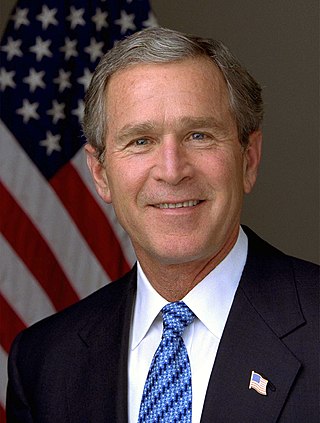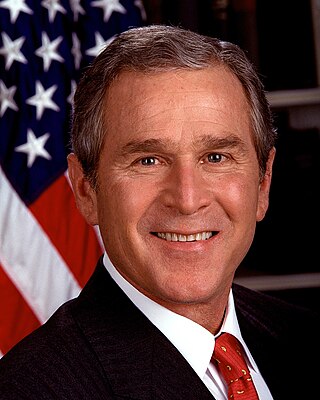
Each of the 50 U.S. states, the District of Columbia, and territories of the United States holds either primary elections or caucuses to help nominate individual candidates for president of the United States. This process is designed to choose the candidates that will represent their political parties in the general election.

Super Tuesday is the United States presidential primary election day in February or March when the greatest number of U.S. states hold primary elections and caucuses. Approximately one-third of all delegates to the presidential nominating conventions can be won on Super Tuesday, more than on any other day. The results on Super Tuesday are therefore a strong indicator of the likely eventual presidential nominee of each political party.

From January 19 to June 8, 2004, voters of the Republican Party chose its nominee for president in the 2004 United States presidential election. Incumbent President George W. Bush was again selected as the nominee through a series of primary elections and caucuses culminating in the 2004 Republican National Convention held from August 30 to September 2, 2004, in New York City.

Super Tuesday 2008, Super Duper Tuesday, Mega Tuesday, Giga Tuesday, Tsunami Tuesday, and The Tuesday of Destiny are names for February 5, 2008, the day on which the largest simultaneous number of state U.S. presidential primary elections in the history of U.S. primaries were held. Twenty-four states and American Samoa held either caucuses or primary elections for one or both parties on this date. Furthermore, the week-long Democrats Abroad Global Primary began on this day.
The results of the 2008 Democratic Party presidential primaries are the detailed outcomes of a series of contests by which members of the United States Democratic Party chose their candidate for the 2008 U.S. presidential election. The contests are held in each of the fifty U.S. states, as well as the District of Columbia, Puerto Rico, American Samoa, Guam, the U.S. Virgin Islands, and Democrats Abroad. The Northern Mariana Islands was the lone U.S. state or territory which did not have a primary or caucus election in 2008. The outcomes include totals of delegates selected as well as popular votes.

The 2000 Missouri Democratic presidential primary took place on March 7, 2000, as one of 15 states and one territory holding primaries on the same day, known as Super Tuesday, in the Democratic Party primaries for the 2000 presidential election. The Missouri primary was an open primary, with the state awarding 92 delegates towards the 2000 Democratic National Convention, of which 75 were pledged delegates allocated on the basis of the results of the primary.

The 2000 California Democratic presidential primary took place on March 7, 2000, as one of 16 contests scheduled on Super Tuesday in the Democratic Party primaries for the 2000 presidential election, following the Washington primary the weekend before. It was an open primary, with the state awarding 433 delegates towards the 2000 Democratic National Convention, of which 367 were pledged delegates allocated on the basis of the results of the primary.

From January 3 to June 5, 2012, voters of the Democratic Party chose its nominee for president in the 2012 United States presidential election. President Barack Obama won the Democratic Party nomination by securing more than the required 2,383 delegates on April 3, 2012, after a series of primary elections and caucuses. He was formally nominated by the 2012 Democratic National Convention on September 5, 2012, in Charlotte, North Carolina.

Although American Samoa did not participate in the 2020 presidential election because it is a U.S. territory and not a state, it still participated in the U.S. presidential primaries and caucuses. Former mayor Michael Bloomberg won the Democratic caucus, held on March 3. The Republican caucus, in the form of a territorial convention held on March 18, endorsed incumbent President Donald Trump.

Although the Northern Mariana Islands did not participate in the 2020 presidential election because it is a U.S. territory and not a state, it still participated in the U.S. presidential primaries and caucuses. Senator Bernie Sanders won the Democratic caucus, held on March 14, which would be his last win in the 2020 primary season. The Republican caucus, held on March 15 during the party's commonwealth convention, unanimously voted for incumbent President Donald Trump.

Although Guam did not participate in the 2020 presidential election because it is a U.S. territory and not a state, it still participated in the U.S. presidential primaries and caucuses. Former vice president Joe Biden won the Democratic caucus, held on June 6. The Republican caucus, held on March 14 in the form of a "state convention", endorsed incumbent President Donald Trump.
"Uncommitted" is a voting option in some United States presidential primaries. This option is listed along with the names of individuals running for the position and is often described as "none of the above". Depending on state and party thresholds, voting uncommitted may allow states to send uncommitted delegates to a party's nominating convention.

The 2000 Alaska Democratic presidential caucuses were held on April 22, 2000, as part of the 2000 presidential primaries for the 2000 presidential election. 13 delegates to the 2000 Democratic National Convention were allocated to the presidential candidates.

The 2000 Virginia Democratic presidential caucuses were held on April 15, 2000, as part of the 2000 presidential primaries for the 2000 presidential election. 79 delegates to the 2000 Democratic National Convention were allocated to the presidential candidates.

The 2000 Nevada Democratic presidential caucuses took place on March 12, 2000, as part of the 2000 presidential primaries for the 2000 presidential election. 20 delegates to the 2000 Democratic National Convention were allocated to the presidential candidates.

The 2000 North Dakota Democratic presidential caucuses were held on March 7, 2000, as part of the 2000 Democratic Party primaries for the 2000 presidential election. 14 delegates to the 2000 Democratic National Convention were allocated to the presidential candidates, the contest was held on Super Tuesday alongside primaries and caucuses in 15 other states. Vice President Al Gore won the contest by taking all the delegates.

The 2000 Hawaii Democratic presidential caucuses were held on March 7, 2000, as part of the 2000 Democratic Party primaries for the 2000 presidential election. 33 delegates to the 2000 Democratic National Convention were allocated to the presidential candidates, the contest was held on Super Tuesday alongside primaries and caucuses in 15 other states.

The 2000 Idaho Democratic presidential caucuses were held on March 7, 2000, as part of the 2000 Democratic Party primaries for the 2000 presidential election. 23 delegates to the 2000 Democratic National Convention were allocated to the presidential candidates, the contest was held on Super Tuesday alongside primaries and caucuses in 15 other states. Vice President Al Gore won the contest by taking all the delegates.

The 2000 American Samoa Republican presidential caucuses were held on February 26, 2000, as part of the 2000 Republican Party primaries for the 2000 presidential election. 4 delegates to the 2000 Republican National Convention were allocated to the presidential candidates, the contest was held alongside primaries in Guam and the Virgin Islands.

Although American Samoa will not participate in the 2000 presidential election because it is a U.S. territory and not a state, it participated in the U.S. presidential primaries and caucuses for both the Democratic and Republican parties.











